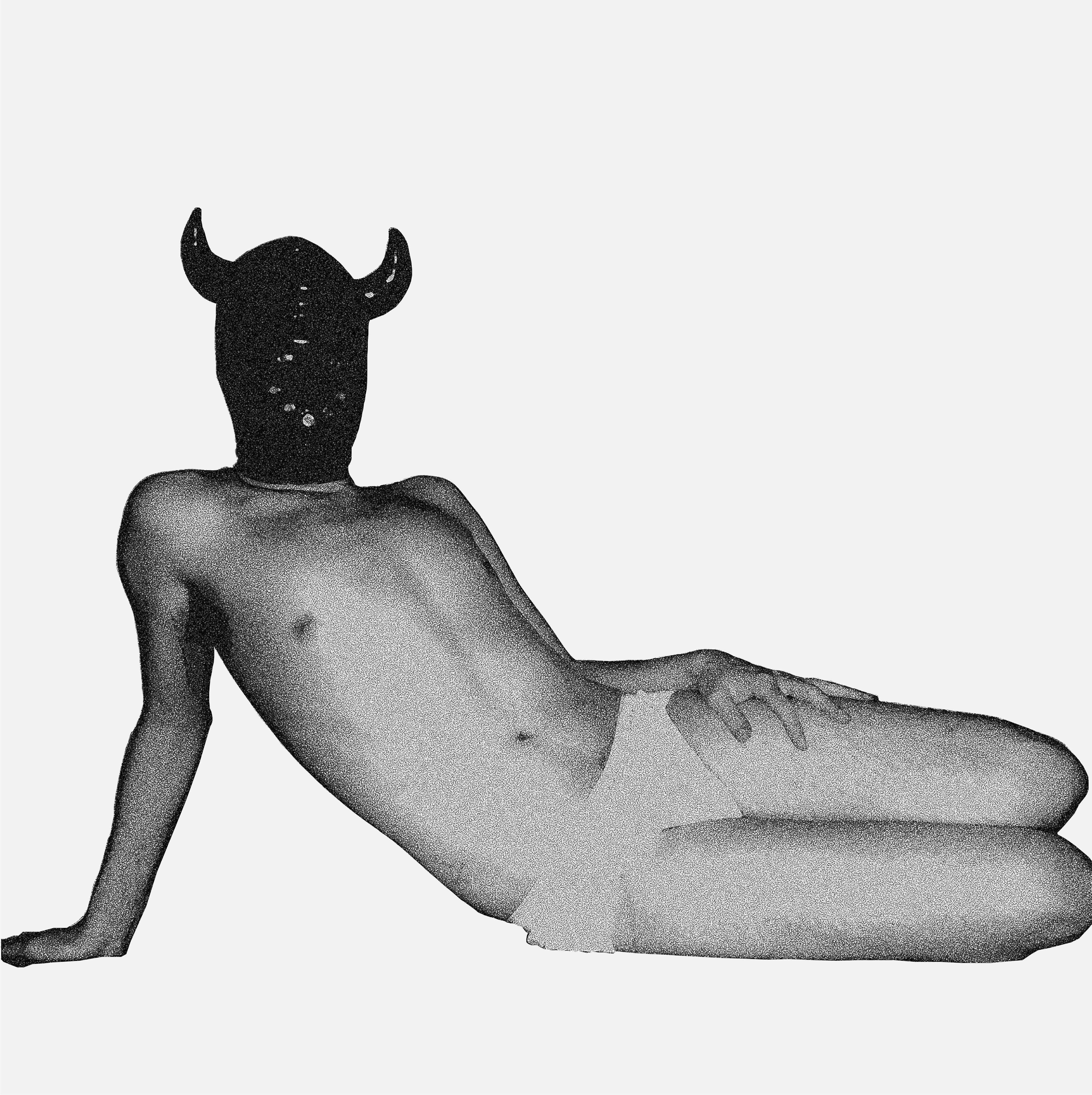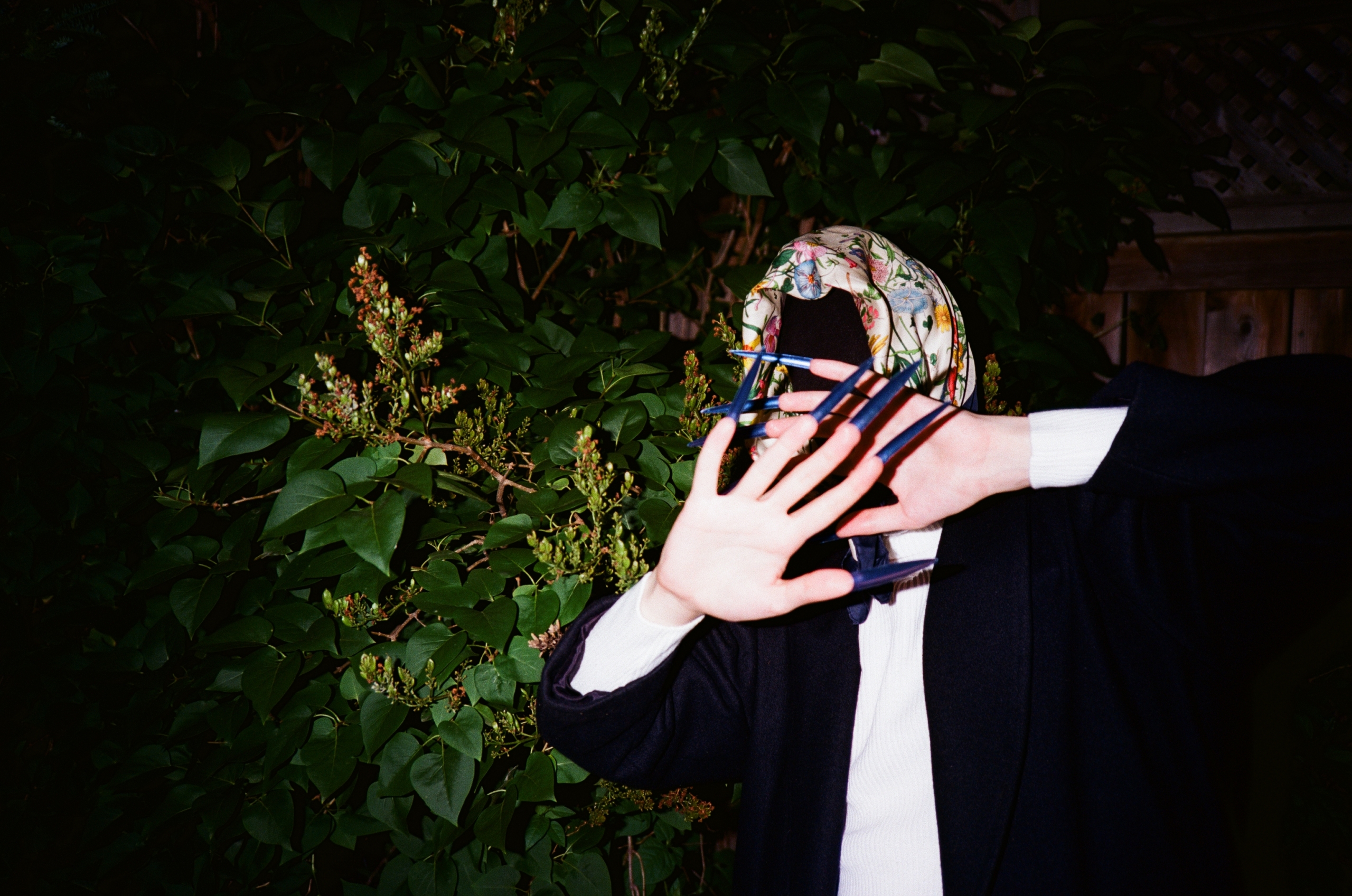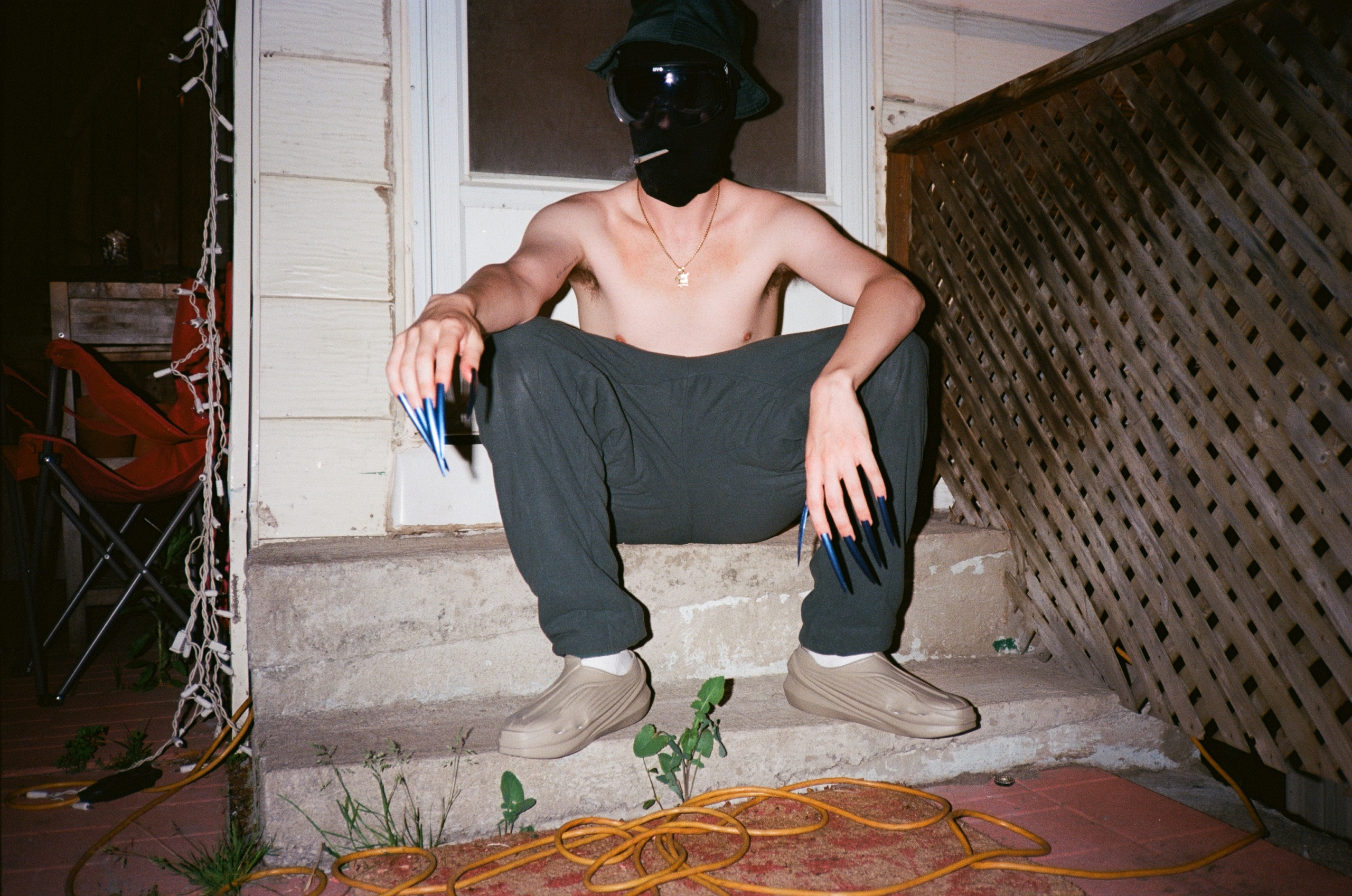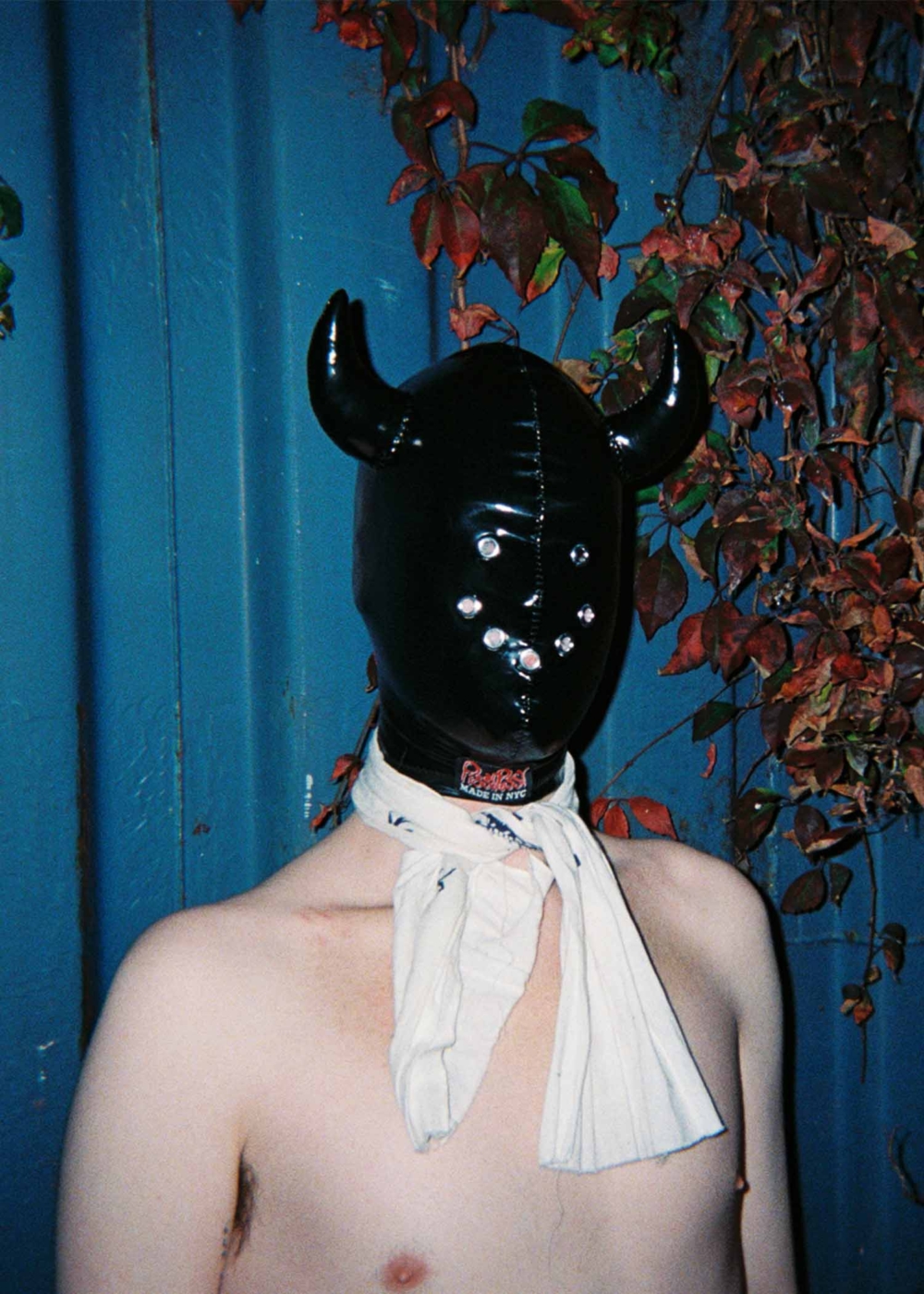Toronto-based independent musician/producer Tin:Ma released their EP, Move on Dec 31 of 2021. A psychedelic trip into the awry world of left-field electronica and hyperpop, Move is a project born of pandemic struggles and a desire to move forward. We spoke with Tin:Ma about the role that music has played in their life and their experience as an independent creator.
You go by the name Tin:Ma, what does that name mean/what is the character Tin:Ma representative of?
Tin:Ma has taken many meanings throughout my persona building and, as I keep making music, will continue to change through time. It pulls from my personal life but the name is also a reimagining of the French word “matin,” which means morning. I like to imagine this altered dawn where the beginning and the end have morphed into new shapes, scents, states, and colours.
Essentially, Tin:Ma is a state I embody/channel while making and performing music. In electronic music, there is a long history of anonymity which greatly appealed to me. I wanted to be a part of that community, I didn’t want my own ego or doubts to get in the way of the music. In other words, I wanted to be free from the limitations of the self.
As an independent musician/producer, what are the benefits or challenges you have experienced working without a label?
There are many challenges that you face when you’re not working with a label, especially as an emerging artist. Labels can do a lot of the heavy lifting when it comes to the business side of things. Still, there is a lot of freedom in independence. I didn’t have to produce music that sounded a particular way and I was free to do whatever I wanted.
The first hurdle many musicians and producers face when working without a label is money, it can be really expensive to produce a record. However, once you acquire the necessary tools and gear, you can make very high-quality work yourself at home: it’s just the initial costs that are hard. It took me several years to raise enough money to buy the gear since I was just a broke kid living in Toronto, all my income went directly towards rent and school. It wasn’t until I lost my apartment that I had extra money to spend on music stuff.
The second big challenge is the business side of things, like PR, networking, distribution, and stuff. They definitely don’t teach you this in music school. Unless you’re working or are associated with reputable music people, the industry won’t pay any attention to you. If you’re independent, then it’s all about numbers: how many streams do you have? How big is your following on social media? What venues are you playing? Who do you know? It’s not really about the music. I have had a few labels reach out to me but I’m still waiting to find the right one. It’s important to work with a label that suits you and your music.

What drives you to create music?
I just need to write, I’m always writing. It’s how I anchor myself into the present and express my inner and outward self. Creation is the comfortable void where I feel most at home. In a way, this drive has corrupted my whole existence. My ex-partner hates when I say this but “It’s the only thing I can do.”
If you could describe Move in only three words respectively what would they be?
I always struggle with these types of questions. Today, I would say Kaleidoscopic. Forward. Release.
Your art is defined by distortion, surrealism, and fluidity, what draws you to this sound and visual aesthetic?
That’s a good question, I don’t know! I can only speculate. I think I have always been drawn to these things. Growing up—and still—I listened to a lot of different types of music. In my own work, I want to be able to pull from whatever source I want in the moment. But, in order to make things fit together (musical genres or ideas), they sometimes need to be distorted or recontextualized. A folk song or form won’t feel the same if it’s coloured with witch house colours, you know.
I think the influence of other queer artists and my own experience with queerness greatly influenced my art. I see myself and the persona as being fluid, not trapped within boundaries. The lines don’t exist in my work.
As for the visual aesthetic, we’re still working on that (laughs). I’m hoping to be able to collaborate with designers and see how they interpret Tin:Ma. Fashion has always been a huge source of inspiration for me, I even mention a lot of my favourite brands and designers in Move: Issey Miyake, Windowsen, Margiela, Iris van Herpen, and Schiaparelli. Hopefully, one day I’ll be able to write music for a runway.
Lately, I have been wearing this amazing devil mask made by Pissy Pussy (@pp_nyc). I fucking love that mask. People talk to you differently when they can’t see your face. Oftentimes, people will order me to take it off so that they can see my face. When I don’t, they’ll proceed to insult me, say that my music is garbage, ask me how big my dick is, and call me a “gay white Sia.” Other people fucking love it, they don’t want to know or care about the person behind the mask: they just want to see Tin:Ma. I find this very interesting.
How would you like people to experience this EP?
There is no right way to experience Move, you should just experience it however you want.
I like to think of music as a dialogue, an exchange between creator and listener. I want to take the audience by the hand and venture into various spaces and states. Move ventures into some brutal, heavy, and pessimistic territories but there are tender moments of joy and celebration. I hope that people will be able to experience and relate to the wide array of emotions found across the EP but also just fucking dance, chill out, and have fun.
What were your greatest inspirations while creating Move?
There were so many. The main idea behind the EP was the fluidity of self and the passing of time. I spent a lot of time pondering these thoughts: how do we experience time and the self? My friends always laugh at me when I say this but I wanted to make a very Toronto record. A lot of the drums were recorded in Toronto, I worked with mostly Toronto musicians, and the EP cover was designed in Toronto. I wanted to channel my inner Toronto neckbeard and reimagine the music I consumed there. Toronto was where I first began to really listen to music, it’s where I discovered most of my major influences. My sound owes a lot to the city. As you may know, I was forced to leave the city due to the pandemic and this EP really helped me through my homesickness.
You collaborated with Toronto-based artist Bigue Fague and Dallas rapper/producer Divinecowgurl on this EP. What did these artists bring to the project?
Oh, they brought so much to Move. The key musical theme across the EP was movement, how could we move across sonic territories (sonic pallets, musical genres, and styles) throughout each track. In “Yasspilled,” I wanted to make something fun that people could dance to. Bigue Fague’s unique production and style fit the ironic and playful nature of the song, we were referencing an overdone TikTok meme after all. Their contribution manically destabilizes the track but also provides it which a lot of structure and motion.
I love working with Divinecowgurl and she really made “States of Pussy”! I was so happy when she asked me to remix her track, “Ana Nicole.” I love her voice, her professionalism, and she’s definitely someone to watch out for. Her flow is just so natural, fierce, and fun. She brought the fire, the passion, to the track which complements my more sombre, supportive, section. It was an honour to have the queen of Pussycore on one of the tracks.
How has your community supported you through your creative process?
I spent most of my time alone and isolated due to the pandemic, I work and live in a basement with no windows. Time has taken a different shape and tint here in the country. Still, I am very lucky to have a supportive network of people around me. Move also allowed me to work with friends, and even make new friends. The music continually brings me out of my isolation and I am very grateful for that, “I’m thankful for the love I share with my friends.”

If there were 5 Toronto artists or musicians you’d like to put our readers on to, who would they be?
There is so much great music being made in Toronto, it’s difficult to pick (laughs)! Definitely check out Bambii (@bam_bii), River Tiber (@rivertiber), Casey MQ (@caseymq), and Projectwhatever (@projectwhatever) for some cool music and check out Dylan Moore’s amazing furniture and sculptures (@dylanmoore_studio).
Also, check out Bigue Fague (@bigue_fague) and Divinecowgurl (@divinecowgurl), they both have
wicked bangers!
What was your experience during COVID, how did you stay creative and how did you fill the void of the creativity and community of live music?
I’m always writing, so in a way, I had more time to focus on the music. Still, it was hard to be isolated all of the time. It’s still hard being isolated, I can’t wait for this to be over. Part of my income was live performance and freelance gigs, now it was all gone. I didn’t realize just how important performance was to me until it was taken away. I had taken it for granted.
I had a lot of emotions throughout the pandemic, a lot of difficult times. There were moments where it felt like I had lost everything and this really made me question my role as an artist.
This isolation and loneliness became overwhelming. So I decided to use this EP to push me forward. Move was Tin:Ma reminding me that I needed to keep going. This inertness that I was experiencing was an illusion, I was still always in motion.
How have you seen the electronic/digital music community evolve over the course of the pandemic?
There have been a lot more people, especially amateurs, releasing music which I think is super cool. Everyone should try writing something or making a mix, music is for everyone.
Where would you like to take your music next? Any sounds you would like to explore or venues you would like to perform at in the near future?
I really want to perform Move live and maybe go on a small tour (Toronto and Montreal being my first stops), work with other people and collaborate on some new projects, and just go dancing with members of the community.
My next project is going to be exploring similar sounds to the EP, this industrial psychedelic rock-pop sound, and I’m hoping to drop a mixtape with some ambient/heavy stuff on it later this year, but we’ll see. Otherwise, I’m probably going to be DJing some gigs this summer which I am really looking forward to.


Kate is an Editorial Intern at liminul.
She is a writer, photographer, and graphic designer based in Montreal. Kate is currently in her final year of her B.A. at McGill University where she is double majoring in history and art history.

